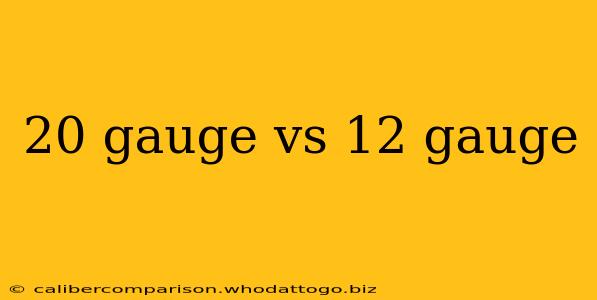Choosing between a 20-gauge and a 12-gauge shotgun is a common dilemma for both seasoned hunters and newcomers alike. The decision hinges on several factors, including intended use, physical capabilities, and personal preferences. This comprehensive guide will delve into the key differences between these two popular gauges, helping you make an informed choice.
Gauge Explained: Understanding the Numbers
Before diving into the specifics, it's crucial to understand what "gauge" signifies. The gauge of a shotgun refers to the number of lead balls, each with a diameter equal to the inside diameter of the barrel, that would weigh one pound. Therefore, a 12-gauge shotgun has a larger bore diameter than a 20-gauge, meaning it fires a larger shot.
Key Differences: 20 Gauge vs. 12 Gauge
| Feature | 20 Gauge | 12 Gauge |
|---|---|---|
| Shell Size | Smaller, lighter shells | Larger, heavier shells |
| Recoil | Less recoil, easier to manage | More recoil, can be more challenging |
| Power | Less powerful, suitable for smaller game | More powerful, effective for larger game |
| Weight | Generally lighter weight | Generally heavier weight |
| Cost | Often less expensive ammunition | Often more expensive ammunition |
| Availability | Ammunition may be less readily available | Wide availability of ammunition |
20 Gauge: The Lightweight Champion
The 20-gauge shotgun is a popular choice for several reasons. Its lighter weight and reduced recoil make it ideal for younger shooters, smaller-framed individuals, or those who find the recoil of a 12-gauge too much to handle. It's perfectly suited for hunting smaller game like quail, dove, and pheasant. The reduced recoil also promotes faster follow-up shots. While the power is less than a 12-gauge, modern ammunition advancements mean it's still capable of taking down larger game, albeit with more precise shot placement.
Advantages of a 20 Gauge:
- Reduced Recoil: Easier to manage, especially for beginners or smaller shooters.
- Lighter Weight: Less fatigue during extended hunting sessions.
- More Maneuverable: Easier to handle in tight quarters.
- Cost-effective: Often cheaper ammunition than 12-gauge.
Disadvantages of a 20 Gauge:
- Less Powerful: Might not be ideal for larger game at longer ranges.
- Reduced Availability: Ammunition may be less readily available in some areas.
12 Gauge: The Powerhouse
The 12-gauge shotgun remains the most popular choice for a reason: power. Its larger bore and heavier shot deliver significantly more stopping power, making it highly effective for hunting larger game such as deer, turkey, and waterfowl. While the recoil is stronger, experienced shooters find this manageable, and the increased power often allows for longer shots with better penetration.
Advantages of a 12 Gauge:
- More Powerful: Excellent stopping power for larger game.
- Greater Range: Effective at longer distances.
- Wide Availability: Ammunition is readily available almost everywhere.
- Versatility: Suitable for a wide range of hunting applications.
Disadvantages of a 12 Gauge:
- Stronger Recoil: Can be uncomfortable for some shooters, especially beginners.
- Heavier Weight: Can lead to fatigue during longer hunting trips.
- Higher Cost: Ammunition is generally more expensive.
Choosing the Right Gauge: The Verdict
Ultimately, the best choice between a 20-gauge and a 12-gauge depends entirely on your individual needs and preferences. Consider these questions:
- What will you primarily use the shotgun for? Smaller game calls for a 20-gauge, while larger game demands a 12-gauge.
- What is your physical stature and strength? If you're a smaller shooter or recoil is a concern, a 20-gauge is a safer bet.
- What is your budget? Both ammunition and shotguns themselves can vary in price.
- What is the ammunition availability in your area?
By carefully considering these factors, you can confidently choose the shotgun gauge that best suits your shooting style and hunting needs. Remember to always practice safe gun handling and seek expert advice if needed.

